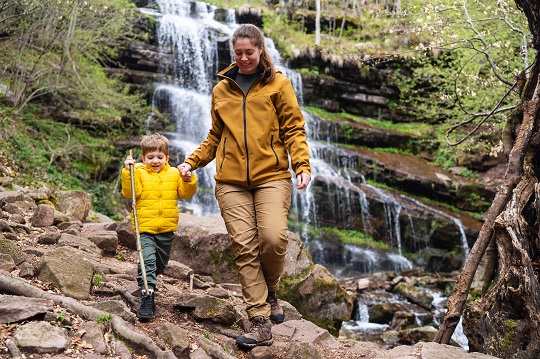
By Tony Nguyen, PTA, Physical Therapist Assistant
Fall is upon us and hiking is a wonderful way to explore the great outdoors, get a workout in, and clear your mind. However, if you’ve ever experienced knee pain while hiking, you know how quickly it can turn an enjoyable day into a struggle. Whether you're dealing with chronic pain, recent injuries, or the effects of past traumas, physical therapy can help get you back to the trail.
The following are common knee problems often experienced by hikers:
- Patellofemoral Pain Syndrome or Runner’s Knee: Often experienced as pain around the kneecap, this condition can arise from overuse, improper footwear, or muscle imbalances.
- Iliotibial Band Syndrome (ITBS): This is a common issue for hikers, characterized by pain on the outside of the knee, often caused by repetitive movements or poor alignment.
- Meniscus Tears: Sudden twists or heavy lifting can lead to tears in the cartilage of the knee, causing pain, swelling, and stiffness.
- Tendonitis: Conditions like patellar tendonitis can develop from repetitive strain, leading to pain and inflammation in the tendons around the knee.
- Arthritis: Osteoarthritis (wear and tear) or rheumatoid arthritis can cause joint pain and stiffness, making it difficult to enjoy hiking.
The Role of Physical Therapy
Physical therapy offers a holistic approach to managing knee problems, focusing on pain relief, improved mobility, and strengthening the surrounding muscles. This includes:
- Assessment and Diagnosis: A physical therapist will perform a thorough assessment, looking at your knee's range of motion, strength, and alignment. This helps identify the specific issues affecting your knee and allows for a tailored treatment plan.
- Pain Management: Techniques such as ice therapy, ultrasound, or electrical stimulation can help alleviate pain and inflammation. Your therapist may also teach you self-management strategies to use during hikes.
- Strengthening Exercises: Building strength in the muscles surrounding the knee is crucial. Targeted exercises for the quadriceps, hamstrings, and hip muscles can help provide better support for your knee joint, reducing the risk of injury.
- Flexibility and Mobility Training: Stretching exercises can improve flexibility and range of motion, which are essential for a smooth hiking experience. Your therapist may incorporate dynamic stretches and balance training to enhance stability.
- Gradual Return to Hiking: A good physical therapy program will include a phased approach to returning to hiking. Your therapist can help you design a progressive plan that starts with low-impact activities, gradually increasing intensity and duration.
Tips for Hiking with Knee Problems
In addition to physical therapy, to follow are some practical tips for enjoying hiking despite knee issues:
- Choose Your Trails Wisely: Opt for gentler, well-maintained trails that don’t require excessive elevation changes.
- Use Proper Footwear: Invest in supportive hiking shoes or boots that provide adequate cushioning and stability.
- Warm-Up and Cool Down: Always start with a warm-up to prepare your muscles and end with a cool-down to promote recovery.
- Listen to Your Body: Pay attention to any signs of discomfort. It’s better to take breaks or turn back than to push through pain.
- Consider Hiking Poles: Using trekking poles can help reduce the load on your knees, providing extra support and stability.
Knee problems shouldn’t keep you from enjoying the great outdoors with the right approach, including physical therapy, you can effectively manage your knee issues and reclaim your love for hiking. Whether you're going through steep trails or simply enjoying a walk in the woods, physical therapy can help you build the strength and confidence needed to hit the trails again!
-----------------
Tony Nguyen, PTA, is a physical therapist assistant at RWJBarnabas Health Ambulatory Care Center in Livingston, NJ. He treats patients with both orthopedic and neurological conditions, with a special interest in concussion and Parkinson's disease. He has completed the LSVT Big certification and is currently working with early intervention children as a child developmental specialist. Tony completed his bachelor’s degree in history and education at Rutgers in 2010 and received his associates of physical therapist assistant at Essex County College in 2016. When Tony is not in the clinic, he enjoys being active, spending time with family and traveling the world.
The experienced and compassionate staff at Cooperman Barnabas Medical Center Rehabilitation centers, with locations in West Orange and Livingston, offers adults and children the specialized care they need to resume an active life after surgery, injury or illness. Staff is committed to providing patients with the most advanced services in a safe, caring and soothing environment. For high-risk patients who are unable to visit in person, telehealth is an option. Patients do not need a prescription for physical therapy services.
For more information, or to schedule an appointment, call 973-322-7500.